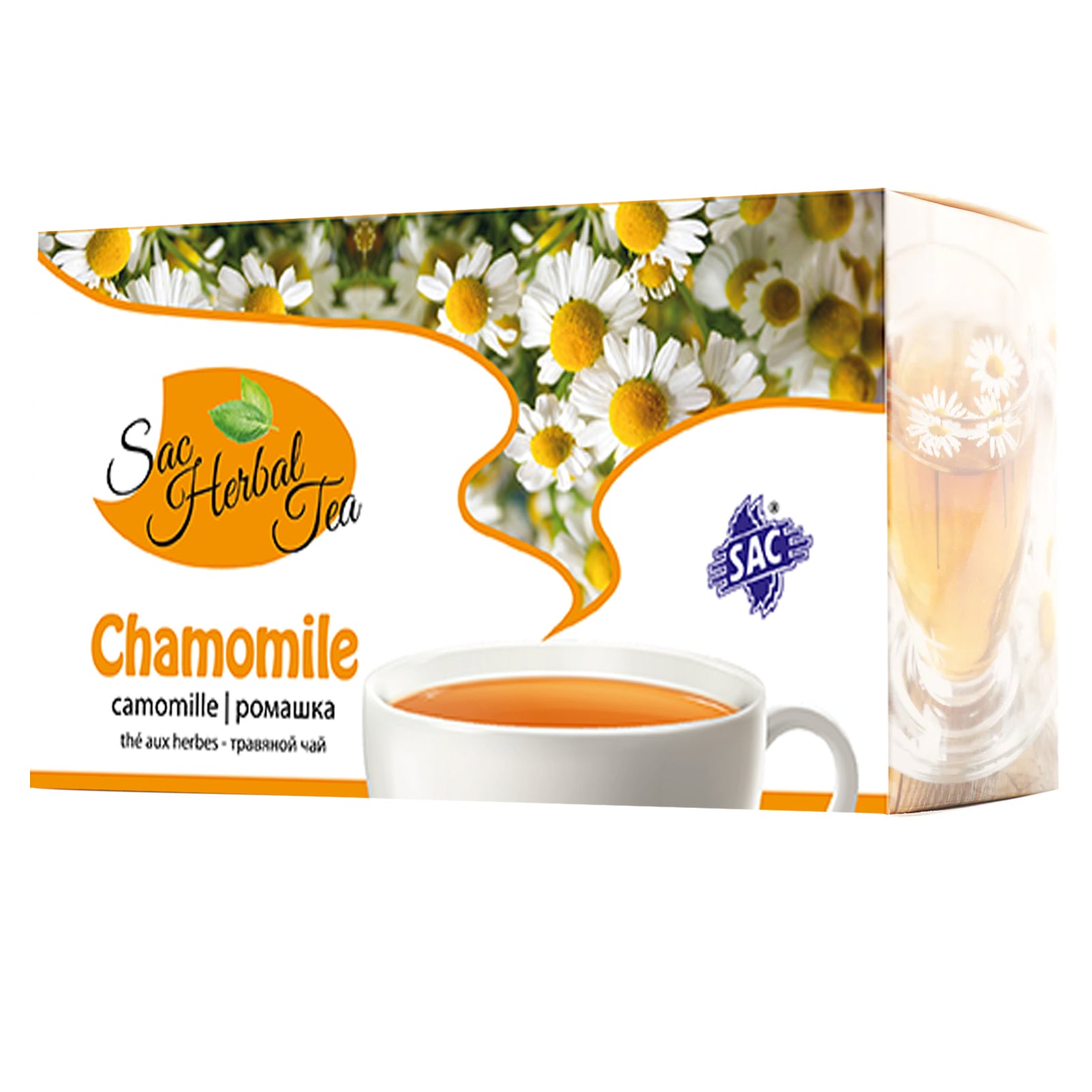


Chamomile herbal tea is a popular and soothing beverage enjoyed worldwide for its calming properties and delightful flavor. Tea has a rich history and a long-standing tradition as a natural remedy for various ailments.
Chamomile, scientifically known as Matricaria chamomilla or Chamaemelum nobile, is an herbaceous plant belonging to the Asteraceae family. It is native to regions of Europe, Asia, and North Africa. The plant has delicate, daisy-like white flowers with yellow centers that exude a gentle, apple-like fragrance.The flowers for chamomile herbal tea were harvested when they bloomed. These blossoms dried naturally in the sun or through air drying to preserve their therapeutic compounds and flavors. The dried chamomile flowers are then ready to be transformed into a soothing and healthful infusion.
Chamomile herbal tea is derived exclusively from the flowers of the chamomile plant. These flowers contain essential oils, antioxidants, and other bioactive compounds responsible for the tea's well-known health benefits and relaxing effects. The most common species used for tea production are German chamomile (Matricaria chamomilla) and Roman chamomile (Chamaemelum nobile). Both types share similar properties, making them suitable for brewing the delightful chamomile herbal tea we all know and love.
Throughout history, chamomile herbal tea has been cherished for its gentle nature, making it a popular choice for promoting relaxation, relieving stress, and aiding sleep. Its delicate, slightly sweet taste and aromatic profile make it an inviting option for those seeking a calming and caffeine-free alternative to traditional teas.
Whether enjoyed as a comforting bedtime ritual or a soothing remedy for everyday stress, chamomile herbal tea continues to be embraced for its natural goodness and therapeutic benefits. As we delve deeper into the world of this ancient herbal infusion, we discover its time-honored reputation as a cherished herbal remedy that brings a sense of tranquility to tea lovers around the globe.
The best time to take chamomile herbal tea depends on personal preferences and the benefits you wish to derive from it. Chamomile tea is a versatile beverage that can be enjoyed throughout the day, and each time has its unique advantages. Here are some suggested times to consider:
Evening and Bedtime:
One of the most popular times to drink chamomile tea is in the evening or before bedtime. Chamomile's calming and relaxing properties can help soothe the nerves, reduce stress, and promote a sense of tranquility, making it an excellent choice for unwinding after a long day. Many people find that drinking chamomile tea before bedtime aids in falling asleep and improves sleep quality.
After Meals:
Chamomile tea can be consumed after meals to aid digestion. It may help reduce bloating, cramping, and indigestion, making it a suitable option for those with digestive issues to promote better digestion after a heavy meal.
During Stressful Situations:
Whenever you feel stressed, anxious, or overwhelmed, sipping on chamomile tea can be a soothing and natural way to alleviate tension and promote relaxation. It can be especially beneficial during stressful times at work or before important events.
Mid-Afternoon Slump:
If you experience a mid-afternoon energy dip, chamomile tea can be a refreshing alternative to caffeinated beverages. Its natural calming effects can help you relax without disrupting your sleep later in the day.
Cold and Flu Season:
Chamomile tea is known for its immune-boosting properties, so consuming it during cold and flu season or when you feel under the weather can be beneficial. The tea's antioxidant content may help support your body's defenses against illnesses.
When You Need a Caffeine-Free Option:
Since chamomile tea is naturally caffeine-free, it can be enjoyed at any time of day, including in the evening, without interfering with your sleep patterns.
Ultimately, the best time to drink chamomile herbal tea is when you feel you could benefit from its calming and therapeutic effects. If you have any specific health concerns or conditions, consult your healthcare provider to determine the best time and frequency for consuming chamomile tea.
Chamomile herbal tea offers potential health benefits, making it a beloved and time-tested remedy for various ailments. Here are some of the benefits of taking chamomile herbal tea:
Promotes Relaxation and Reduces Stress:
Chamomile tea has a calming effect on the nervous system. Chamomile herbal tea can help reduce anxiety, stress, and promote relaxation, making it an excellent beverage for unwinding after a long day.
Aids in Better Sleep:
Chamomile tea is a natural sleep aid. Its soothing properties can help improve sleep quality and may be particularly beneficial for individuals struggling with insomnia or sleep disturbances.
Supports Digestive Health:
Chamomile has anti-inflammatory and antispasmodic properties that can help soothe the digestive system. Chamomile tea may alleviate indigestion, bloating, gas, and stomach cramps.
Boosts Immune System:
Chamomile tea contains antioxidants that can help strengthen the immune system. Regular consumption may support your body's defense against infections and illnesses.
Reduces Menstrual Discomfort:
For some women, chamomile tea may help ease menstrual cramps and discomfort due to its anti-inflammatory and muscle-relaxing properties.
Provides Skin Benefits:
Topical application of cooled chamomile tea or using chamomile tea bags as compresses may help soothe skin irritations, including rashes, sunburns, and mild skin conditions.
May Lower Blood Sugar Levels:
Some research suggests that chamomile tea may help regulate blood sugar levels and improve insulin sensitivity for individuals with diabetes.
Supports Heart Health:
Chamomile tea's antioxidant content supports heart health by reducing oxidative stress and inflammation.
Acts as an Antioxidant:
Chamomile tea is rich in antioxidants, such as flavonoids, which help neutralize harmful free radicals in the body and protect cells from damage.
Natural Anti-Inflammatory:
Chamomile contains compounds with anti-inflammatory properties, which may help alleviate conditions like arthritis and other inflammatory disorders.
Supports Respiratory Health:
Drinking chamomile tea can help ease symptoms of common respiratory conditions, such as colds, allergies, and sore throats, due to its soothing and anti-inflammatory effects.
Allergic Reactions:
If you have a known allergy to plants in the Asteraceae family, such as ragweed, daisies, marigolds, or chrysanthemums, you may be at risk of allergic reaction to chamomile. Allergic reactions to chamomile can range from mild skin irritation to more severe symptoms like difficulty breathing. If you experience any signs of an allergic reaction, such as itching, hives, or swelling, stop consuming chamomile tea and seek medical attention.
Interaction with Medications:
Chamomile may interact with certain medications, including blood thinners, anticoagulants, sedatives, and medicine metabolized by the liver. If you are taking any prescription medications, consult your healthcare provider before consuming chamomile tea.
Pregnancy and Breastfeeding:
Pregnant women and breastfeeding mothers should exercise caution when consuming chamomile tea. While chamomile is generally considered safe, large quantities may have uterine-stimulating effects, potentially posing a risk during pregnancy. It's best to consult healthcare professionals before using chamomile tea during these stages.
Sedative Effects:
Chamomile tea may cause mild sedation and drowsiness, especially when consumed in large quantities or combined with other sedative medications. Avoid driving or operating heavy machinery if you feel excessive drowsy after drinking chamomile tea.
Sensitivity to Ragweed:
Chamomile and ragweed share a similar profile of allergenic proteins. If you are sensitive to ragweed, chamomile may trigger a reaction.
Children and Infants:
While chamomile tea is safe for children and infants to soothe digestive issues or promote better sleep, it's essential to use it in moderation and consult with a pediatrician before giving it to young children.
Preparing Safe Tea:
Use genuine chamomile flowers and follow proper preparation guidelines to avoid contamination or adulteration with other plants or substances.